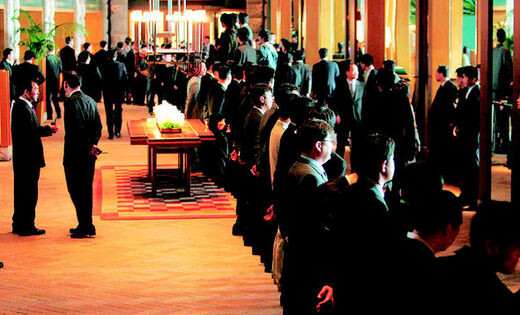hankyoreh
Links to other country sites 다른 나라 사이트 링크
U.S. Dems criticize Korean labor practices

Sixteen Democrats in the U.S. House of Representatives recently sent a letter to South Korean President Roh Moo-hyun and U.S. Trade Representative Susan Schwab, urging them to correct "markedly worsened" labor conditions as soon as possible.
In a letter, they noted that South Korean labor law and government practices are quashing basic labor rights. The letter, in line with new trade policies of Democrats who now control U.S. Congress, is likely to affect the current ministerial-level FTA talks between South Korea and the United States.
The letter, titled "Labor Conditions in South Korea" and obtained by the Hankyoreh on March 29, was conveyed to President Roh through the South Korean Embassy in the U.S. on March 23. The letter contained the signatures of 16 Democrats, including Representative Dennis Kucinich, who has announced he will run for the presidency.
The letter stressed the importance of the labor rights issue in trade relations between the two countries. It states the U.S. expected labor rights in South Korea to improve after the nation joined the Organization of Economic Cooperation and Development (OECD) in 1996, but the situation has worsened instead, it continues.
The letter specifically referred to so-called non-regular workers - or those hired on short-term contracts - who currently make up 55 percent of the South Korean workforce and are slighted on pay, benefits, and job security as compared to regular workers. It also referred to labor organizers currently imprisoned for their activities, the government forcibly closing the offices of the civil servants’ union, as well as the government continuing to place limitations on labor rights.
In connection with two laws involving labor-management relations and non-regular workers, which passed in the National Assembly at the end of last year, the U.S. lawmakers criticized them for disregarding recommendation of the International Labor Organization (ILO) by banning union pluralism until 2010 and removing obligatory provisions to protect unfairly dismissed workers.
The letter also criticized another new law regarding non-regular workers, which says that companies can only keep them at such status for a maximum of two years before giving them full-time worker status. However, the result has been massive layoffs of non-regular workers approaching the two-year mark.
"As you are aware," the letter reads, "the issue of labor rights is of critical importance in our bilateral trade relations...We therefore urge you to take action as soon as practicable to release from jail all trade unionists that may be held for legitimate trade union activity and to fully implement the recommendations of the ILO."
It has yet to be confirmed whether such demands are affecting ongoing Korea-U.S. FTA negotiations. A high-ranking government official familiar with the negotiations said, "Initially, negotiations on the labor sector were expected to be easily completed, but the two nations have not reached an agreement over the draft because the U.S. has changed its position since the 8th round of talks." The official asked not to be named due to the sensitivity of the issue.
Under new trade policies recently decided by Democrats, the U.S. administration should reflect ILO recommendations when signing trade deals. Accordingly, after U.S. FTAs with Peru and Colombia, settled last year, were rejected by the Congress, Trade Representative Schwab has been having negotiations to correct the draft of the proposed U.S.-S.K. agreement.
Meanwhile, Park Seok-beom, a South Korean FTA negotiator, said, "We are expecting some response on the issue from the U.S. Congress by March 29. If the U.S.’s final demands fall within what is allowed by Korean law, we can immediately accept the trade deal. But if the U.S. demands go beyond Korean law, the remaining negotiations will have to be handled by higher-ranking government officials."
Please direct questions or comments to [englishhani@hani.co.kr]
Editorial・opinion
![[Column] Has Korea, too, crossed the Rubicon on China? [Column] Has Korea, too, crossed the Rubicon on China?](https://flexible.img.hani.co.kr/flexible/normal/500/300/imgdb/original/2024/0419/9317135153409185.jpg) [Column] Has Korea, too, crossed the Rubicon on China?
[Column] Has Korea, too, crossed the Rubicon on China?![[Correspondent’s column] In Japan’s alliance with US, echoes of its past alliances with UK [Correspondent’s column] In Japan’s alliance with US, echoes of its past alliances with UK](https://flexible.img.hani.co.kr/flexible/normal/500/300/imgdb/original/2024/0419/2317135166563519.jpg) [Correspondent’s column] In Japan’s alliance with US, echoes of its past alliances with UK
[Correspondent’s column] In Japan’s alliance with US, echoes of its past alliances with UK- [Editorial] Does Yoon think the Korean public is wrong?
- [Editorial] As it bolsters its alliance with US, Japan must be accountable for past
- [Guest essay] Amending the Constitution is Yoon’s key to leaving office in public’s good graces
- [Editorial] 10 years on, lessons of Sewol tragedy must never be forgotten
- [Column] A death blow to Korea’s prosecutor politics
- [Correspondent’s column] The US and the end of Japanese pacifism
- [Guest essay] How Korea turned its trainee doctors into monsters
- [Guest essay] As someone who helped forge Seoul-Moscow ties, their status today troubles me
Most viewed articles
- 1[Column] The clock is ticking for Korea’s first lady
- 2[Column] Has Korea, too, crossed the Rubicon on China?
- 3After 2 months of delayed, denied medical care, Koreans worry worst may be yet to come
- 4US overtakes China as Korea’s top export market, prompting trade sanction jitters
- 5[Editorial] When the choice is kids or career, Korea will never overcome birth rate woes
- 6[Correspondent’s column] In Japan’s alliance with US, echoes of its past alliances with UK
- 7Hong Se-hwa, voice for tolerance whose memoir of exile touched a chord, dies at 76
- 8Nearly 1 in 5 N. Korean defectors say they regret coming to S. Korea
- 9John Linton, descendant of US missionaries and naturalized Korean citizen, to lead PPP’s reform effo
- 10Strong dollar isn’t all that’s pushing won exchange rate into to 1,400 range